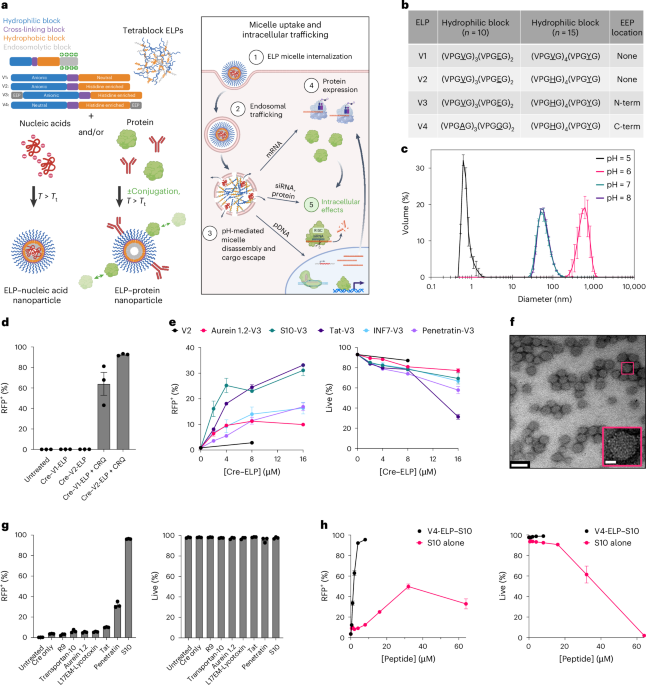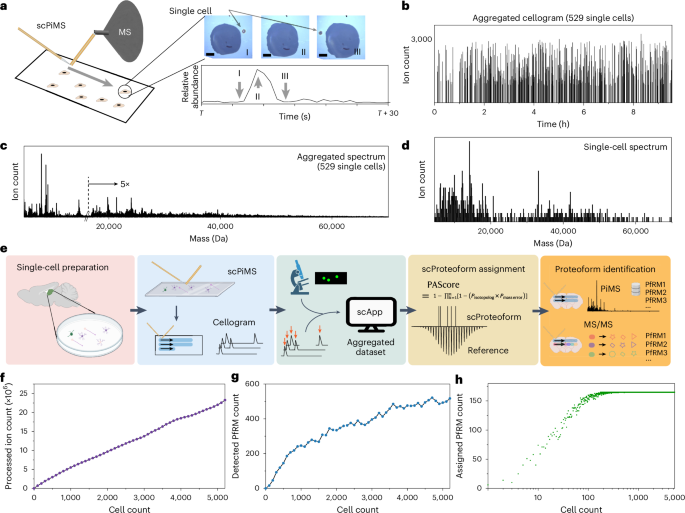Now Reading: Protein Nanoparticles Pave Way for Efficient Cytosolic Delivery of Nucleic Acids and Proteins
-
01
Protein Nanoparticles Pave Way for Efficient Cytosolic Delivery of Nucleic Acids and Proteins
Protein Nanoparticles Pave Way for Efficient Cytosolic Delivery of Nucleic Acids and Proteins

Swift Summary:
- The raw text provided lists references to scientific studies and articles predominantly focused on advancements in biotechnology, particularly gene therapy, mRNA-based treatments, RNA therapeutics, and CRISPR-Cas9 applications.
- Key topics include the efficacy and safety of mRNA vaccines for SARS-CoV-2 (COVID-19), RNAi therapeutics for hereditary conditions like transthyretin amyloidosis, CRISPR-Cas9 technology addressing genetic diseases like sickle cell disease and β-thalassemia, CAR T-cell therapies for cardiac injuries, delivery mechanisms of nucleic acids for protein replacement therapy, nanotechnology applications in drug delivery systems, biomacromolecule therapies via intracellular delivery methods, gene therapy viral vector platforms advancements among others.
indian Opinion Analysis:
India has made significant strides in adopting biotech innovations such as mRNA vaccines during the pandemic. The referenced literature highlights global advancements that serve as potential blueprints for India’s healthcare sector. Gene-editing technologies like CRISPR-Cas9 offer possibilities to address hereditary diseases prevalent in India while reducing long-term healthcare costs associated with chronic care management. Similarly, nanotechnology-driven drug delivery systems hold promise in enhancing treatment effectiveness across rural areas where healthcare infrastructure is limited. Investments by Indian academia or industry into these rapidly evolving fields could prove transformative not just domestically but also globally given India’s reputation as a hub for affordable pharmaceutical production and innovation.
Read moreQuick Summary
- The article delves into evolving gene therapy techniques, including viral vector technology, lipid nanoparticles for mRNA delivery, and cell-penetrating peptides.
- References include studies on therapeutic advancements like nucleic acid delivery methodologies using engineered biomaterials and peptide-based nanoparticles.
- Topics covered focus on innovative approaches to drug delivery systems aimed at medical applications.
indian Opinion Analysis
India has been a growing hub for biotechnology research and clinical trials. The advancement discussed in this study, such as mRNA carriers or peptide-based drugs could be significant for India’s pharma sector. With an increasing demand for tailored gene therapy solutions to treat diseases like cancer or genetic disorders, these emerging technologies offer avenues to reduce the costs of treatment in India. Moreover, the integration of academic collaborations with ongoing government initiatives like “Make in India” could accelerate domestic production capabilities for bio-nanotechnology materials.
Link: Read MoreQuick Summary:
- The article discusses advancements in protein-based biomaterials for various medical applications, including drug delivery, targeted imaging, antithrombotic therapies, and gene delivery.
- Research highlights include genetically engineered elastin-like polypeptides (ELPs) that exhibit unique self-assembly properties under specific conditions such as temperature changes.
- Key studies explore ELPs’ behavior for creating nanostructures like spherical micelles or nanoparticles designed to enhance precision in therapeutic applications.
- Focused innovations include techniques for delivering nucleic acids to target cells and bioengineering systems tailored for in vivo gene therapy targeting tumors.
indian Opinion Analysis:
the developments outlined indicate transformative potential within biotechnology and healthcare sectors globally.For India specifically, these advancements highlight opportunities within oncology treatments and precision medicine frameworks which can be adapted to local health priorities like cancer care accessibility or genetic disorder management initiatives if timely adopted & scaled – while longer read research isn’t provided-II needs कदम
Quick Summary
- A news article outlines advanced research in gene and protein delivery systems, showcasing various scientific methodologies.
- The focus is on innovations such as using cationic lipids, growth of cell-penetrating peptides for enhanced intracellular delivery, and the use of antimicrobial peptides interacting with lipid bilayers.
- Applications include genome editing,selective hematopoietic stem cell transplantation,oral insulin delivery techniques,and endosomal escape strategies for effective gene therapy.
- Multiple references to published studies from reputable journals like Nature Biotechnology and Science Reports are highlighted.
Indian Opinion Analysis
India stands at a unique juncture where advancements in biotechnology could have significant health infrastructure implications. Innovations detailed in this report can inspire Indian researchers to explore novel gene therapies or drug delivery methods tailored for local healthcare conditions. While exciting prospects exist for applications like insulin delivery or genome editing therapeutics, India’s challenge remains affordability and accessibility across its diverse population. Emphasizing innovation partnerships with global research institutions could accelerate technology transfer while building domestic capabilities.
Link: Read moreQuick Summary
- The article explores advancements and applications of cell-penetrating peptides (CPPs) that enable efficient drug delivery through cellular membranes.
- Research includes mechanisms of CPP interactions with lipid membranes,cellular uptake,and translocation methods. Various studies analyze different peptides for their biochemical properties and therapeutic potential.
- Multiple references describe CPP-driven technologies for intracellular protein transport, diagnostic applications in human diseases, and membrane-active peptide studies to optimize drug delivery systems.
- Findings highlight how CPPs can enhance treatment platforms across preclinical research to clinical request stages.
Indian Opinion Analysis
The study on cell-penetrating peptides holds significant implications for India’s pharmaceutical industry and medical research ecosystem. Improved drug delivery mechanisms powered by CPPs could complement India’s emerging biopharmaceutical capabilities while aiding cost-effective treatments for various diseases prevalent in the country. Given India’s vast healthcare landscape marked by affordability concerns, innovations like these may offer scalable options to address critical needs like cancer therapeutics or diagnostics advancements.
However,translating such cutting-edge global research into practice will necessitate strong collaborative efforts between Indian academic institutions,biotech firms,and regulatory bodies-paving the way for both scientific innovation and equitable access to modern medicine.
Link: read moreIt appears your input contains references related to scientific research and doesn’t include specific news content regarding India. Please provide an actual article or text concerning developments, events, or topics relevant to India for me to write the Quick Summary and Indian Opinion Analysis sections accurately.quick Summary:
- The article focuses on advancements in biotechnology and gene editing tools, particularly CRISPR-Cas9 and related methodologies.
- It highlights innovative delivery mechanisms for ribonucleoproteins using lipid nanoparticles and amphiphilic peptides.
- Methods discussed include gene therapy applications in cancer treatment and stem cell generation.
- Research spans safety, efficiency, stability, and therapeutic potential of the proposed solutions across diverse biological models.
Indian Opinion Analysis:
The integration of advanced biotech into healthcare has significant implications for India’s growing medical research sector. India’s biopharma industry could benefit greatly from innovations enabling safer gene editing techniques with improved delivery systems like lipid nanoparticles or polypeptides. This aligns with the nation’s goals to enhance genetic therapies addressing prevalent diseases such as cancer or hereditary disorders while ensuring cost-effectiveness for wider accessibility among its large population base.
Given India’s stance as a hub for clinical research, these breakthroughs could also position it competitively within global biotech domains. However, adopting such methods might encounter practical hurdles such as infrastructure readiness and regulatory frameworks surrounding ethical applications in healthcare.
Read More: Link to Article ReferenceQuick Summary
- The article discusses advances in biopharmaceutical purification technologies, genome editing, and therapeutic applications.
- It highlights methods for endotoxin removal and innovations in CRISPR/Cas9-mediated gene editing.
- Research on thermoresponsive polypeptide fused l-asparaginase shows enhanced efficacy in treating hematologic malignancies while minimizing immunogenicity.
- Other studies focus on macrophage motility modulation, protein nanoparticles for nucleic acid/protein delivery, and murine models for chronic lung disease transition caused by Pseudomonas aeruginosa.
Indian Opinion Analysis
The breakthroughs presented reflect global advancements that India can adapt to strengthen biomedical research and healthcare solutions domestically. Techniques like CRISPR gene-editing could help address genetic disorders prevalent in the Indian population efficiently if integrated within local healthcare frameworks. Furthermore, improved biopharmaceutical purification processes might enhance vaccine production-a crucial area for India as a leading global supplier of vaccines-while minimizing risks associated with endotoxins. Collaboration between Indian institutes and international researchers could fast-track harnessing these technologies to tackle regional challenges such as infectious diseases or cancer treatment optimization.






















